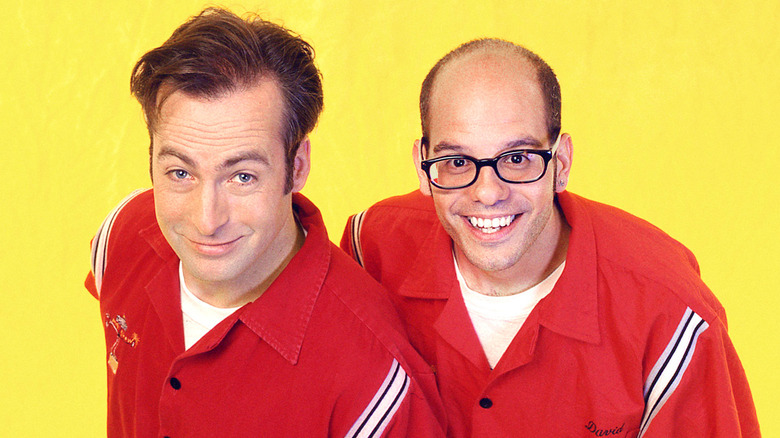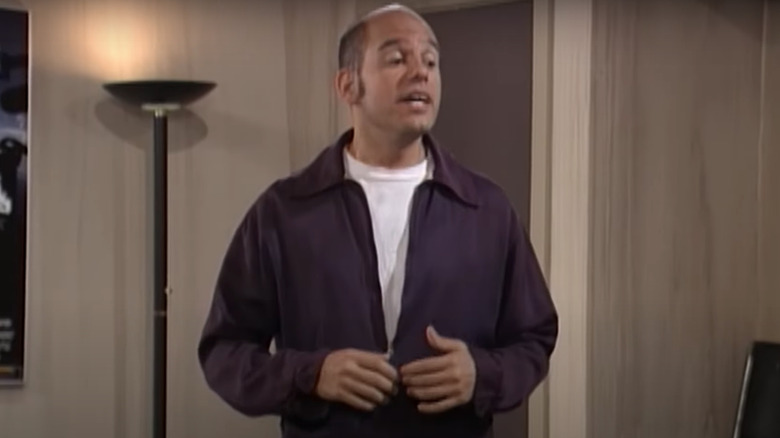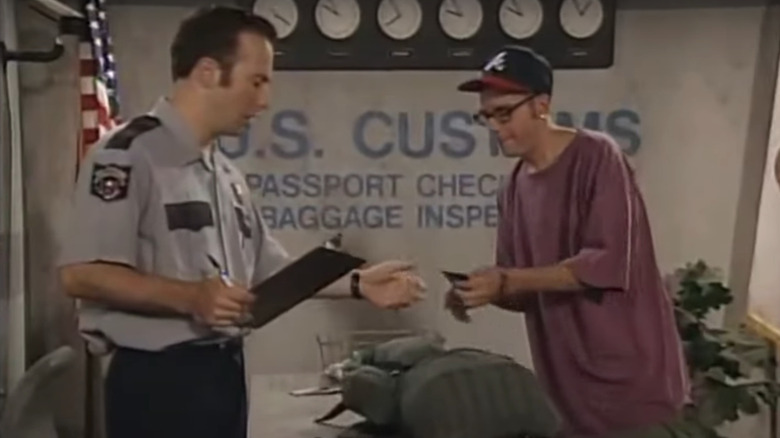The Moment Bob Odenkirk Knew Mr. Show Was Over
There are multiple points in Bob Odenkirk's career that can teach us all a thing or two about perseverance. At one point, the "Better Call Saul" star was on the shortlist of names to play Michael Scott on "The Office." In fact, he came so close to taking the lead role that towards the end of casting it was down to Odenkirk and Steve Carell, before NBC ultimately decided to go with the latter.
It must have been disheartening for Odenkirk, who up until that point had carved out an impressive career in comedy, winning Emmys for his writing on "Saturday Night Live" and "The Ben Stiller Show," but never quite gaining the stardom he deserved. He'd made the move to on-camera talent with Stiller's series and was front and center in his and David Cross' own HBO sketch show "Mr. Show With Bob And David," which ran from 1995 to 1998. But after "Mr Show" ended, Odenkirk seemed to struggle to find his way.
Once Carell was chosen over him for "The Office" in 2004, the future star would have to wait until 2009, when he was cast as Saul Goodman in "Breaking Bad," for things to really take off. Now, having starred in Vince Gilligan's mega-hit, reprising his Goodman role for "Better Call Saul," and becoming a badass John Wick-type in the 2021 action hit "Nobody," Odenkirk is a household name. Which just goes to show, sometimes you just gotta hold on for the right break. But back in 1998, when HBO was getting ready to axe Mr. Show, things must have seemed a little bleak, especially since they were still making the show and could see the writing on the wall.
'Okay, this is over'
"Mr. Show" ran for four seasons on HBO and in that time played host to an array of future comedy stars such as Sarah Silverman, Jack Black, and Scott Aukerman. It became a cult hit and would influence the future comedy landscape in a way that comedians aspire to do. Without "Mr. Show" there might not be a Tim and Eric — who Odenkirk helped launch after the pair used a neat trick to grab his attention.
Alas, "Mr. Show" was doomed once its fourth season arrived and HBO moved the sketch show to the dreaded Monday midnight slot. According to supporting cast member Scott Adsit: "It was like [HBO was] trying to get them canceled" — which seems highly likely. Odenkirk and Cross were, at the time, pretty busy helping out with Tenacious D's HBO show and once the news came that they had been moved to midnight, Odenkirk said he, too, knew things were doomed. Speaking to NPR, he said: "Everyone — the writers, the actors — everyone involved and certainly David and I just felt like 'Okay, this is over.' Even though we hadn't even aired yet."
His concerns were validated once Odenkirk encountered a fan at a gas station who had completely missed the entire fourth season due to its impractical time slot. The actor said this guy "had been looking for it, and it had been airing, and he'd completely missed it. So even our fans couldn't find us." Unsurprisingly, the show wasn't renewed for a fifth season.
The legacy of Mr. Show
In the years since its cancellation, "Mr. Show" has gained a legendary status among comedians and comedy fans. Its irreverent style and absurdist takes on everything from confusing audition monologues to America blowing up the moon resonated in a way that gave the show a slow-building cult following. That low-key yet fervent appreciation for Odenkirk and Cross' sketch series led to a 2015 Netflix revival in the form of "W/ Bob & David."
And while its principal stars would find fame in other places, "Mr. Show" has more than cemented its legacy as an important moment in the evolution of sketch comedy. Just why HBO moved the show to the midnight slot for its fourth season remains a mystery, though it was likely down to overall poor ratings, which only worsened with the move to midnight.
In a larger sense, the comedy of "Mr. Show" remains distinctly "alt," as the phrase goes. For some reason, we love referring to things that are actually funny as "alternative," and "Mr. Show" embodied that whole thing in the late-'90s. Since then, its brand of absurdist humor seems to have gained a more mainstream appreciation, with the likes of Tim and Eric and more recently Tim Robinson's excellent "I Think You Should Leave" helping to keep a similarly "alt" form of comedy in the public consciousness. Back in the '90s, there was no Netflix to pick up the stuff that major networks and cable channels discarded. In that sense, the current streaming age isn't without its benefits. Even if we are drowning in a flood of "content," at least that flood is big enough to bring the alt stuff along with its tide.


